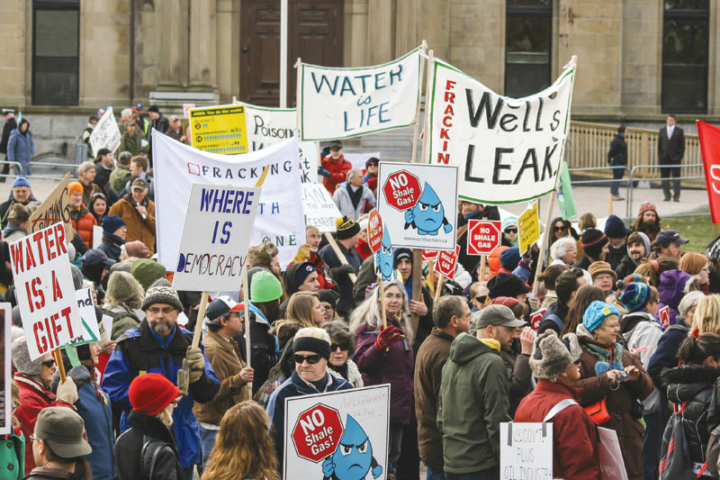Let’s Get Real About Energy Security, Shale Gas, And Energy Transition
Debunking Premier Higgs' claims about Saint John LNG conversion, N.B.'s role in European energy crisis, and shale gas development
Debunking Premier Higgs’ claims about Saint John LNG conversion, N.B.’s role in European energy crisis, and shale gas development
Premier Blaine Higgs is pushing a private-sector company, Repsol, to convert its Saint John LNG (liquefied natural gas) import terminal into an export terminal for energy security, economic development and energy transition.
We are told that shipping liquified methane gas to Europe can address energy security issues due to the Russian invasion of Ukraine.
Higgs says we could convert the Saint John plant from an import facility to an export facility within three years. He says there could be economic development if we lift the province’s shale gas moratorium to speed up the process and make the conversion more cost effective relative to other methane gas supply and pipeline options.
And, the premier claims New Brunswick can advance energy transition as the LNG terminal could “easily be converted” to hydrogen in the future.
Are these arguments factual? You decide.
Energy security: Can New Brunswick gas help quickly solve Europe’s energy supply issues?
Converting an import terminal into an export terminal cannot meet Europe’s near-term worries about winter heating. Projects optimistically require three to five years to complete.
Converting the plant for export requires increased access to gas supply, which could come from building additional pipeline capacity or shale gas supply in New Brunswick.
Premier Higgs has spoken publicly about lifting the hydraulic fracturing moratorium, put in place in 2014, to supply the export terminal. Experts say it takes more than five years to prove there is enough gas to warrant an LNG investment. Meanwhile, studies out of Europe show Europe’s energy needs will largely be resolved within three years without the need for new LNG infrastructure.
Local gas supply: Should New Brunswick lift the shale gas moratorium?
Shale gas extraction poses risks to New Brunswick’s freshwater supply, human health, and does not align with provincial and federal climate targets.
Greenhouse gas (GHG) emissions from extraction, transport, liquefaction, and re-gasification are comparable to burning coal if methane leakage is high, meaning there is little climate benefit.
Companies claim future GHG emissions standards can be met using carbon capture and storage technology (CSS). CCS only captures a fraction of the total life-cycle emissions from the extraction, transport, and use of methane gas. It’s expensive, energy intensive, and has produced mediocre results to date.
Fracking can contaminate surface water. In areas of North America with significant shale gas development, researchers find elevated levels of ammonium, benzene, barium, strontium, chloride, halides, bromide and radium in rivers downstream from facilities.

Fracking uses a lot of water. Nearby freshwater drinking supplies can be depleted if large volumes of surface and groundwater are quickly extracted.
Previous estimates of New Brunswick shale gas operations suggested between four and 12.4 million liters of wastewater could be generated in the first four years. Fracking wastewater contains toxic and cancer-causing chemicals and companies have not produced a viable plan for treating it in N.B.
Critically, a key requirement for shale gas development is early and meaningful consultations with First Nations, an area which Natoaganeg First Nation Chief George Ginnish says government is “falling short.”
Germany is vocal about accessing Canadian methane gas. Yet Germany has indefinitely banned fracking and reaffirmed that stance in light of the energy crisis. Why are the risks of fracking not okay for German citizens, but considered acceptable for New Brunswickers as part of the LNG export conversion?
Energy transition: How easy is it to convert an import LNG plant to exports and then to hydrogen?
Converting an import terminal into an export terminal requires a significant overhaul and added hazards, including increased risks of fire and explosion, and greater complexity, plant size and use of high-pressure and reactive chemicals.
Liquefaction of methane gas is an energy-intensive process, estimated to be the equivalent of up to 10 per cent of the gas being liquefied.
Premier Higgs argues the LNG export terminal can be “easily” converted for hydrogen.
This is disputed by experts who note that: gasified hydrogen can damage existing pipeline infrastructure; hydrogen must be cooled to –250C to maintain a liquid state suitable for storage and shipment, unlike methane gas requiring -160C; and, converting to hydrogen requires new vessels, storage systems, and potentially pipelines.
Say no to shale gas
New Brunswick should focus on energy security at home.
It will take at least five years to develop a resource Europe needs this winter.
We need to keep shale gas in the ground, leave the moratorium in place and build renewable energy, especially onshore and offshore wind, to supply regional electricity systems, and industrial and export needs.
Premier Higgs, please be honest with New Brunswickers about the costs, timelines, and environmental and health risks associated with converting Repsol’s Saint John LNG plant.
Share this article with your friends and family
